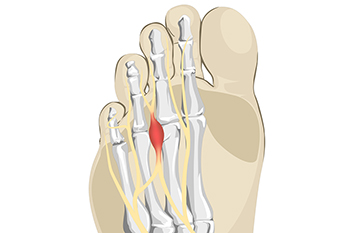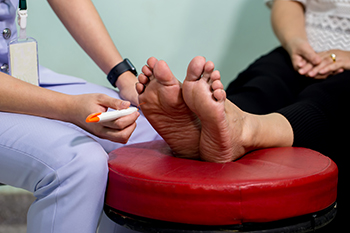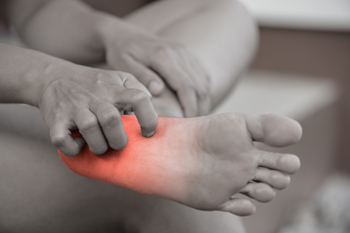Connect With Us
Blog
Items filtered by date: July 2024
Definition and Incidence of Morton’s Neuroma

Morton's neuroma is a painful condition affecting the nerves between the toes, most commonly the third and fourth toes. It involves a thickening of the tissue around one of the nerves leading to the toes, causing sharp, burning pain or a sensation of stepping on a pebble. This benign growth, also known as intermetatarsal neuroma, results from repeated stress or irritation, often due to activities that involve wearing tight shoes or high heels. The incidence of Morton's neuroma varies, affecting more women than men, and typically occurring between the ages of 30 to 50. It involves the interdigital nerves becoming compressed or irritated, leading to inflammation and discomfort. If you have pain between these toes, it is suggested that you seek counsel from a podiatrist who can accurately diagnose and treat Morton’s neuroma.
Morton’s neuroma is a very uncomfortable condition to live with. If you think you have Morton’s neuroma, contact one of our podiatrists of Advantage Foot and Ankle Center . Our doctors will attend to all of your foot care needs and answer any of your related questions.
Morton’s Neuroma
Morton's neuroma is a painful foot condition that commonly affects the areas between the second and third or third and fourth toe, although other areas of the foot are also susceptible. Morton’s neuroma is caused by an inflamed nerve in the foot that is being squeezed and aggravated by surrounding bones.
What Increases the Chances of Having Morton’s Neuroma?
- Ill-fitting high heels or shoes that add pressure to the toe or foot
- Jogging, running or any sport that involves constant impact to the foot
- Flat feet, bunions, and any other foot deformities
Morton’s neuroma is a very treatable condition. Orthotics and shoe inserts can often be used to alleviate the pain on the forefront of the feet. In more severe cases, corticosteroids can also be prescribed. In order to figure out the best treatment for your neuroma, it’s recommended to seek the care of a podiatrist who can diagnose your condition and provide different treatment options.
If you have any questions, please feel free to contact our office located in Newark, DE . We offer the newest diagnostic and treatment technologies for all your foot care needs.
Symptoms of Diabetic Peripheral Neuropathy

Diabetic peripheral neuropathy is a common issue for individuals with type 2 diabetes, with nearly half experiencing this complication. This condition arises when prolonged high blood sugar levels cause damage to the nerves, especially in the feet and lower legs. Symptoms of peripheral neuropathy include numbness, tingling, burning sensations, and muscle weakness, which can progressively disrupt daily activities. A significant concern is “diabetic foot,” where the loss of feeling and poor blood flow can lead to ulcers, infections, and in severe cases loss of limb. Diabetic neuropathy also can increase the risk of falls and fractures due to lack of sensation in the feet, impaired balance and reduced coordination. Factors such as smoking, high blood pressure, obesity, and cholesterol issues can further increase the risk of developing this diabetic peripheral neuropathy. Early detection and proper management are of extreme importance. If you notice unusual sensations in your feet or lower legs, especially persistent numbness or pain, it is suggested that you make an appointment with a podiatrist who can conduct a thorough examination and recommend a personalized treatment plan.
Neuropathy
Neuropathy can be a potentially serious condition, especially if it is left undiagnosed. If you have any concerns that you may be experiencing nerve loss in your feet, consult with one of our podiatrists from Advantage Foot and Ankle Center . Our doctors will assess your condition and provide you with quality foot and ankle treatment for neuropathy.
What Is Neuropathy?
Neuropathy is a condition that leads to damage to the nerves in the body. Peripheral neuropathy, or neuropathy that affects your peripheral nervous system, usually occurs in the feet. Neuropathy can be triggered by a number of different causes. Such causes include diabetes, infections, cancers, disorders, and toxic substances.
Symptoms of Neuropathy Include:
- Numbness
- Sensation loss
- Prickling and tingling sensations
- Throbbing, freezing, burning pains
- Muscle weakness
Those with diabetes are at serious risk due to being unable to feel an ulcer on their feet. Diabetics usually also suffer from poor blood circulation. This can lead to the wound not healing, infections occurring, and the limb may have to be amputated.
Treatment
To treat neuropathy in the foot, podiatrists will first diagnose the cause of the neuropathy. Figuring out the underlying cause of the neuropathy will allow the podiatrist to prescribe the best treatment, whether it be caused by diabetes, toxic substance exposure, infection, etc. If the nerve has not died, then it’s possible that sensation may be able to return to the foot.
Pain medication may be issued for pain. Electrical nerve stimulation can be used to stimulate nerves. If the neuropathy is caused from pressure on the nerves, then surgery may be necessary.
If you have any questions, please feel free to contact our office located in Newark, DE . We offer the newest diagnostic and treatment technologies for all your foot care needs.
Managing Common Sports Injuries
 Common sports injuries that affect the ankle and foot include sprains, strains, swollen muscles, and fractures. Acute injuries, such as sprains, occur suddenly due to a specific incident like twisting the ankle. These injuries result in pain, swelling, and instability, often requiring immediate attention. Chronic overuse injuries, like plantar fasciitis, develop over time from repetitive stress and can cause persistent pain and stiffness. Ankle sprains happen when the ligaments supporting the ankle stretch or tear, typically from a sudden twist or impact. Symptoms include pain, swelling, bruising, and difficulty bearing weight. Plantar fasciitis involves inflammation of the plantar fascia, a thick band of tissue running along the bottom of the foot. It causes sharp heel pain, especially in the morning or after prolonged activity. If you have persistent foot or ankle pain from sports participation, it is suggested that you schedule an appointment with a podiatrist for professional guidance. A podiatrist can provide an accurate diagnosis, treatment plan, and preventive strategies to help you recover and return to your sport.
Common sports injuries that affect the ankle and foot include sprains, strains, swollen muscles, and fractures. Acute injuries, such as sprains, occur suddenly due to a specific incident like twisting the ankle. These injuries result in pain, swelling, and instability, often requiring immediate attention. Chronic overuse injuries, like plantar fasciitis, develop over time from repetitive stress and can cause persistent pain and stiffness. Ankle sprains happen when the ligaments supporting the ankle stretch or tear, typically from a sudden twist or impact. Symptoms include pain, swelling, bruising, and difficulty bearing weight. Plantar fasciitis involves inflammation of the plantar fascia, a thick band of tissue running along the bottom of the foot. It causes sharp heel pain, especially in the morning or after prolonged activity. If you have persistent foot or ankle pain from sports participation, it is suggested that you schedule an appointment with a podiatrist for professional guidance. A podiatrist can provide an accurate diagnosis, treatment plan, and preventive strategies to help you recover and return to your sport.
Sports related foot and ankle injuries require proper treatment before players can go back to their regular routines. For more information, contact one of our podiatrists of Advantage Foot and Ankle Center . Our doctors can provide the care you need to keep you pain-free and on your feet.
Sports Related Foot and Ankle Injuries
Foot and ankle injuries are a common occurrence when it comes to athletes of any sport. While many athletes dismiss the initial aches and pains, the truth is that ignoring potential foot and ankle injuries can lead to serious problems. As athletes continue to place pressure and strain the area further, a mild injury can turn into something as serious as a rupture and may lead to a permanent disability. There are many factors that contribute to sports related foot and ankle injuries, which include failure to warm up properly, not providing support or wearing bad footwear. Common injuries and conditions athletes face, including:
- Plantar Fasciitis
- Plantar Fasciosis
- Achilles Tendinitis
- Achilles Tendon Rupture
- Ankle Sprains
Sports related injuries are commonly treated using the RICE method. This includes rest, applying ice to the injured area, compression and elevating the ankle. More serious sprains and injuries may require surgery, which could include arthroscopic and reconstructive surgery. Rehabilitation and therapy may also be required in order to get any recovering athlete to become fully functional again. Any unusual aches and pains an athlete sustains must be evaluated by a licensed, reputable medical professional.
If you have any questions please feel free to contact our office located in Newark, DE . We offer the newest diagnostic and treatment technologies for all your foot and ankle needs.
Do You Suffer From Painful Feet?
Improving Balance Helps to Avoid Falls

As people age, maintaining balance becomes increasingly vital to prevent falls, a common and potentially serious issue for seniors. Factors such as poor posture, lack of exercise, and inadequate diet can contribute to balance problems. Improving balance not only reduces the risk of falls but also alleviates the fear of falling, a condition that can hinder daily activities and diminish quality of life. Engaging in gentle exercises, such as standing on one leg while holding onto a chair, can significantly enhance balance. Joining exercise classes can further strengthen core muscles and improve stability. Additionally, practicing heel-to-toe walking helps to develop inner leg muscles, which is essential for maintaining balance. Consistency in these activities supports better bone health. However, it is essential to exercise safely by using sturdy supports or attending classes with certified instructors. Always consult your medical advisor before starting any new exercise regimen and be mindful of how medications might impact your balance. It is suggested that you schedule an appointment with a podiatrist for more guidance on how to improve your balance and prevent falls.
Preventing falls among the elderly is very important. If you are older and have fallen or fear that you are prone to falling, consult with one of our podiatrists from Advantage Foot and Ankle Center . Our doctors will assess your condition and provide you with quality advice and care.
Every 11 seconds, an elderly American is being treated in an emergency room for a fall related injury. Falls are the leading cause of head and hip injuries for those 65 and older. Due to decreases in strength, balance, senses, and lack of awareness, elderly persons are very susceptible to falling. Thankfully, there are a number of things older persons can do to prevent falls.
How to Prevent Falls
Some effective methods that older persons can do to prevent falls include:
- Enrolling in strength and balance exercise program to increase balance and strength
- Periodically having your sight and hearing checked
- Discuss any medications you have with a doctor to see if it increases the risk of falling
- Clearing the house of falling hazards and installing devices like grab bars and railings
- Utilizing a walker or cane
- Wearing shoes that provide good support and cushioning
- Talking to family members about falling and increasing awareness
Falling can be a traumatic and embarrassing experience for elderly persons; this can make them less willing to leave the house, and less willing to talk to someone about their fears of falling. Doing such things, however, will increase the likelihood of tripping or losing one’s balance. Knowing the causes of falling and how to prevent them is the best way to mitigate the risk of serious injury.
If you have any questions, please feel free to contact our office located in Newark, DE . We offer the newest diagnostic and treatment technologies for all your foot care needs.
Peripheral Neuropathy and Its Impact on the Feet
 Peripheral neuropathy results from damage to the peripheral nerves, which transmit signals between the central nervous system and the rest of the body. This damage often leads to numbness, tingling, burning, and sharp pain in the feet. Diabetic neuropathy occurs in individuals with diabetes as a result of prolonged high blood sugar levels that damage the nerves. Symptoms in the feet may include a loss of sensation, making it difficult to detect injuries or a feeling of wearing tight socks when barefoot. These symptoms can significantly impact balance and mobility, increasing the risk of falls and infections. Proper management of blood sugar levels, in addition to medications and lifestyle changes, may help to alleviate symptoms of neuropathy. If you are experiencing any of the above symptoms, it is suggested that you confer with a podiatrist who can help you to manage this condition.
Peripheral neuropathy results from damage to the peripheral nerves, which transmit signals between the central nervous system and the rest of the body. This damage often leads to numbness, tingling, burning, and sharp pain in the feet. Diabetic neuropathy occurs in individuals with diabetes as a result of prolonged high blood sugar levels that damage the nerves. Symptoms in the feet may include a loss of sensation, making it difficult to detect injuries or a feeling of wearing tight socks when barefoot. These symptoms can significantly impact balance and mobility, increasing the risk of falls and infections. Proper management of blood sugar levels, in addition to medications and lifestyle changes, may help to alleviate symptoms of neuropathy. If you are experiencing any of the above symptoms, it is suggested that you confer with a podiatrist who can help you to manage this condition.
Neuropathy
Neuropathy can be a potentially serious condition, especially if it is left undiagnosed. If you have any concerns that you may be experiencing nerve loss in your feet, consult with one of our podiatrists from Advantage Foot and Ankle Center . Our doctors will assess your condition and provide you with quality foot and ankle treatment for neuropathy.
What Is Neuropathy?
Neuropathy is a condition that leads to damage to the nerves in the body. Peripheral neuropathy, or neuropathy that affects your peripheral nervous system, usually occurs in the feet. Neuropathy can be triggered by a number of different causes. Such causes include diabetes, infections, cancers, disorders, and toxic substances.
Symptoms of Neuropathy Include:
- Numbness
- Sensation loss
- Prickling and tingling sensations
- Throbbing, freezing, burning pains
- Muscle weakness
Those with diabetes are at serious risk due to being unable to feel an ulcer on their feet. Diabetics usually also suffer from poor blood circulation. This can lead to the wound not healing, infections occurring, and the limb may have to be amputated.
Treatment
To treat neuropathy in the foot, podiatrists will first diagnose the cause of the neuropathy. Figuring out the underlying cause of the neuropathy will allow the podiatrist to prescribe the best treatment, whether it be caused by diabetes, toxic substance exposure, infection, etc. If the nerve has not died, then it’s possible that sensation may be able to return to the foot.
Pain medication may be issued for pain. Electrical nerve stimulation can be used to stimulate nerves. If the neuropathy is caused from pressure on the nerves, then surgery may be necessary.
If you have any questions, please feel free to contact our office located in Newark, DE . We offer the newest diagnostic and treatment technologies for all your foot care needs.
Effective and Easy Exercises for Plantar Fasciitis Relief

Relieving plantar fasciitis pain can be achieved through simple exercises that stretch and strengthen the foot. One effective exercise is the calf stretch, where you lean against a wall with one leg extended back and the other bent forward, stretching the calf muscles and reducing tension on the plantar fascia. The toe stretch involves sitting down and pulling your toes back toward your shin, helping to loosen the fascia. Rolling a tennis ball or frozen water bottle under your foot can massage and alleviate pain. Performing foot flexes by sitting with your legs straight and using a towel to pull your toes toward you can also provide relief. Consistently practicing these exercises can reduce pain and inflammation, promoting healing and preventing future flare-ups. If you have plantar fasciitis and are seeking additional effective foot stretches for relief, it is suggested that you visit a podiatrist, who can provide you with the information you are seeking.
Plantar fasciitis can be very painful and inconvenient. If you are experiencing heel pain or symptoms of plantar fasciitis, contact one of our podiatrists from Advantage Foot and Ankle Center . Our doctors can provide the care you need to keep you pain-free and on your feet.
What Is Plantar Fasciitis?
Plantar fasciitis is the inflammation of the thick band of tissue that runs along the bottom of your foot, known as the plantar fascia, and causes mild to severe heel pain.
What Causes Plantar Fasciitis?
- Excessive running
- Non-supportive shoes
- Overpronation
- Repeated stretching and tearing of the plantar fascia
How Can It Be Treated?
- Conservative measures – anti-inflammatories, ice packs, stretching exercises, physical therapy, orthotic devices
- Shockwave therapy – sound waves are sent to the affected area to facilitate healing and are usually used for chronic cases of plantar fasciitis
- Surgery – usually only used as a last resort when all else fails. The plantar fascia can be surgically detached from the heel
While very treatable, plantar fasciitis is definitely not something that should be ignored. Especially in severe cases, speaking to your doctor right away is highly recommended to avoid complications and severe heel pain. Your podiatrist can work with you to provide the appropriate treatment options tailored to your condition.
If you have any questions please feel free to contact our office located in Newark, DE . We offer the newest diagnostic and treatment technologies for all your foot and ankle needs.

